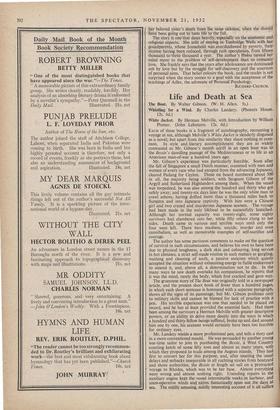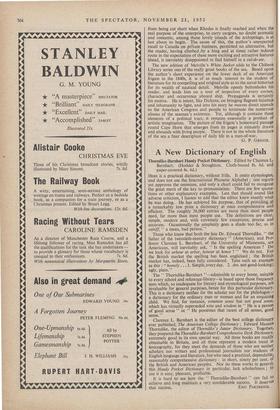Life and Death at Sea
The Boat. By Walter Gibson. (W. H. Allen. 5s.)
EACH of these books is a fragment of autobiography, recounting a voyage at sea, although Melville's White Jacket is slenderly disguised as a novel; but apart from this similarity they share nothing in com- mon. In style and literary accomplishment they are as widely contrasted as Mr. Gibson's month adrift in an open boat was to the Bessie's dawdling passage of the Mediterranean or to life in an American man-of-war a hundred years ago.
Mr. Gibson's experience was particularly Horrible. Soon after the fall of Singapore a small Dutch steamer, crammed with men and women of every race who had escaped from the advancing Japanese, cleared Padang for Ceylon. Those on board numbered about 500 in all, the majority being soldiers, with Sergeant Gibson of the Argyll and Sutherland Highlanders among them. When the vessel was torpedoed, he was also among the hundred and thirty who got safely away; and twenty-six days later he was the only white man to crawl ashore, having drifted more than a thousand miles back to Sumatra and into Japanese captivity. With him were a Chinese girl and two crazed and murderous Japanese seamen. The voyage had been made in the only lifeboat to be successfully launched. Although her normal capacity was twenty-eight, some eighty survivors had clambered into her, while fifty others clung to her sides. Death came in various and terrible ways until only the four were left. There were madness, suicide, murder and even cannibalism, as well as memorable examples of self-sacrifice and courage.
The author has some pertinent comments to make on the question of survival in such circumstances, and believes his own to have been due to physical toughness, a dark skin and colouring, long service in hot climates, a strict self-made routine in such matters as gargling, washing and cleaning of teeth, a passive stoicism which quietly accepted the situation without exhausting energy in futile endeavours to amend it, and, above all, a determination not to die. In the many ways he saw death overtake his companions, he reports that it was the mind, rarely the body, which first cracked and gave way.
The gruesome story of The Boat was originally told in a newspaper article, and the present short book of fewer than a hundred pages, in which each short sentence is honoured with a separate paragraph, shows all the signs of its parentage; but Mr. Gibson professes only to military skills and cannot be blamed for lack of practice with a pen. His terrible experience was one that needed to be placed on record, and he has at least provided the essential facts. Had there been among the survivors a Herman Melville with greater descriptive powers, or an ability to delve more deeply into the ways in which a hundred and thirty fellow beings suffered, broke up and died around him one by one, his account would certainly have been too horrible for ordinary eyes.
Mr. Landery wields a more professional pen, and tells a story cast in a more conventional mould. He was persuaded by another young war-time sailor to join in purchasing the Bessie, a West Country coasting ketch of some fifty tons and almost as many years, with which they proposed _to trade among the Aegean islands. They had first to convert her for this purpose, and, after meeting the usual delays and setbacks inseparable in all yachting stories from boatyard and shore authorities, the Bessie at length set sail on a protracted voyage to Rhodes, which was to be her base. Almost everything went wrong and almost nothing right. Unending repairs to the auxiliary engine kept the vessel interminable weeks:in harbour, and unco-operative winds and calms fantastically spun out the days at sea. The mildly amusing, mildly interesting account of it all suffers from being cut short when Rhodes is finally reached and when the real purpose of the enterprise, to carry cargoes, no doubt aromatic and romantic, among those lovely islands of the archipelago, is at last about to begin. The oause of this, the author's unexpected recall to Canada on private business, permitted no alternative, but the reader, having climbed .by a long and at times rather tedious route in the expectation of these more exciting and attractive features ahead, is inevitably disappointed to find himself in a cul-de-sac.
The new edition of Melville's White Jacket adds to the Chiltern Library series one of the really great books of the sea. Based upon the author's short experience on the lower deck of an American frigate in the 1840s, it is of as much interest to the student of literature for its compelling and original style as to the naval historian for its wealth of nautical detail. Melville openly buttonholes his reader, and leads him on a tour of inspection of every corner, character and occurrence aboard ship. Propaganda is certainly his motive. He is intent, like Dickens, on bringing flagrant injustice and inhumanity to light, and into his story he weaves direct appeals to the American Congress and people to terminate the numerous abuses of the seaman's existence. Yet, although it contains these elements of a political tract, it remains essentially a product of artistic imagination. The picture of the frigate's homeward passage round Cape Horn that emerges from its pages is minutely drawn and abounds with living people. There is not in the whole literature of the sea a finer description of daily life in a man-of-war.
G. P. GRIGGS.











































































 Previous page
Previous page